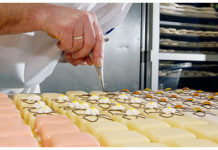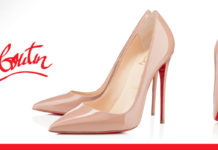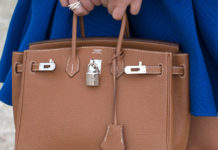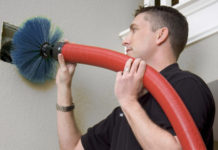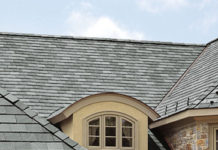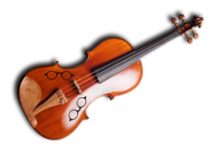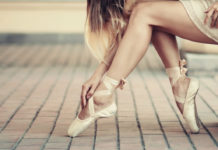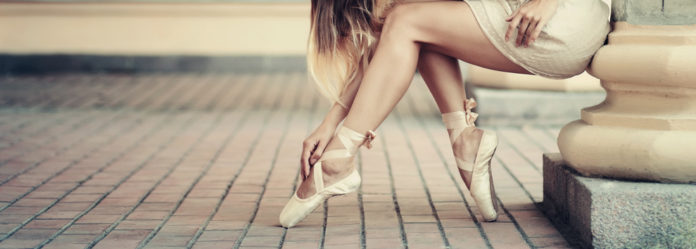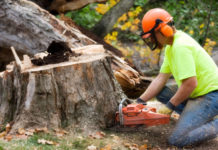Ballpark estimate: $75 to $125+
For many classical ballet dancers, an important part of the experience is going up on pointe. Pointe shoes are special ballet shoes that make it possible for the dancer to glide across the floor and perform dance steps on her toes for an extended period of time. The earliest pointe shoes date back almost two centuries, when dancers donned them to take on a weightless appearance in classic performances such as Swan Lake and Giselle.
Today, dancers continue to covet these shoes, despite the fact that they can be costly and they can also cause foot pain, sores, and blisters. Nonetheless, most ballerinas feel these are minor inconveniences that are a small price to pay it for the joy of the overall experience.
How Are Pointe Shoes Made?
Pointe shoes are typically made using fabric, cardboard, and paper that is layered and glued to meld into a shoe with a formed toe box or platform that supports the dancer to stand on her toes. There is no structure to the heel of the shoe, allowing the dancer to leap, turn, and stretch her feet fully without anything in her way. The whole shoe is then covered in satin, and elastic and ribbon are attached to help it stay snugly on the dancer’s foot.
There are a number of brands that make pointe shoes, both for mass market and also custom versions for professionals and others who desire them. Although there are subtle differences in shape, color shade, and fit from brand to brand, most are somewhat similar and it’s all a matter of what best suites your foot shape and type, and your dancing style.
While the shoe itself is important, a dancer also needs to reach a level of strength, maturity and expertise to be ready to use pointe shoes safely and properly.
Timing Matters
Recreational ballet students may find that a pair of pointe shoes lasts for a few months of classes, while most professional dancers go through one pair—or even several pairs—of pointe shoes in just one rehearsal or performance. (One expert estimated that a typical dancer with the Royal Ballet goes through 170 pairs of pointe shoes every year.) To help you figure out how long a pair of pointe shoes will last you, you can expect anywhere from four to twelve hours of dancing.
With such a short life span, pointe shoe costs can really add up. As a result, many professional ballet companies often provide the shoes for their dancers. But if you have to “foot” your own pointe shoe bill, it’s important to understand the cost and what to expect, so you can plan ahead.
Where to Shop
You can buy pointe shoes at most dancewear stores where shoes are sold. You can also order them from dancewear retailers online. Or, you can get them directly from the manufacturer, who can custom make you a mold that can be used to create shoes to your own specifications. This can be done through a series of special fittings with the shoe maker. The latter is a common perk offered to dancers who have made a name for themselves in the field. But even non-professional dancers can get custom-made shoes by providing a tracing of their foot that the manufacturer can use.
The reason for such a level of customization is that the fit is especially important with pointe shoes—much more even than with other types of dance shoes. This is because in order to dance on your toes, you need a snug fit to ensure your feet are properly supported for best results.
Parts of the Pointe Shoe
The pointe shoe consists of several key parts. These include:
Toe box: This supports the dancer’s toes and contains the platform, which is the tip upon which the dancer balances. This box comes in different shapes for different types of feet.
Shank: This is the sole of the point shoe, which supports the foot and the arch. This can cover part or all of the bottom of the foot and comes in varying degrees of stiffness and flexibility.
Vamp: The vamp is the front part of the shoe, which varies in length. Getting exactly the right vamp length is important in getting the perfect pointe shoe fit.
To use pointe shoes to their full advantage, many dancers use tape, lambs wool, gel pads, toe spacers and other accessories to help them feel as comfortable as possible when dancing in their toes.
Popular Brands
Some of the popular pointe shoe brands include Freed of London, Grishko, Capezio, and Bloch. Gaynor Minden is another option, which is made from different material than the their brands. Unlike the layers of fabric and cardboard in the traditional shoes, Gaynor Minden shoes a bit on the higher end of the cost scale than the most basic other options because they are made from a special material that keeps its shape during use. However, they also last considerably longer than other shoes, so some dancers feel that the investment pays off and they end up costing less overall.
Cost of Pointe Shoes
The cost of pointe shoes depends on the brand you select and the style, as well as whether you buy shoes in store, online, or have them custom made for your feet. In addition, some people hire a pointe shoe fitter to help them weed through the numerous options and narrow in on the best fit for their feet shape and strengths.
In a typical dance shop, the cost of the shoes starts at about $75. At this end of the price scale, you can find some basic Capezio and Bloch pointe shoes. For a little more money, you might prefer Freed of London or Grishko shoes, which can be in the $90 to $115 range. Gaynor Minden shoes cost about $115 to $125 for a pair, depending on where you shop.
For custom-fitted shoes, if you can’t get a personal fitting, many pointe shoe brands can create a shoe for your foot based on some measurements and tracings of your foot shape. This usually adds another $25 or so to cost, so it can run you up to about $150 for a custom pair of pointe shoes made from information you provide about your foot shape. Just keep in mind some brands require a minimum custom order of two or three pairs. In addition, the turnaround time can be from two weeks if you are ordering American shoes to three or four months or even longer if your shoes are coming from abroad.
Budget Option
If your feet are full grown and you have a specific model and style you use, you can also order your shoes online from one of the many discount dance stores. Prices can average about $50 for a good quality pair when you order online. Shipping may be an additional charge.

